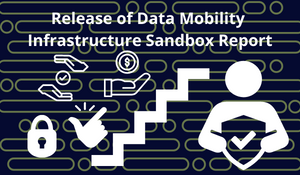The UK is Getting its Go Faster Stripes

The UK Government have fired the starting gun on data regulation to support business and economic growth, set ready to give the UK Go Faster Stripes. As the UK Government lays its foundations to support economic growth it has been busy joining the personal data dots across the Governments initiatives. For anyone closely watching the opportunities in the personal data market they will have found themselves with a busy scheduled on 17th April 2023, and with sight of opportunities founded on a data landscape that appears to be designed to support sustainable growth through the trusted use of personal data.
After four Brexit & Pandemic fuelled fallow years the UK Government are making major strides with three announcements falling on the same day. With a tight constellation of initiatives where Smart Data, meets Open Banking, meets Code of Conduct for the use of personal data. Focusing on the growth potential across these initiatives surfaces opportunities for businesses operating or looking to operate in the UK.
The UK Department for Science, Innovation and Technology @SciTechgovuk Data Protection & Digital Information Bill sailed through its 2nd parliamentary reading on 17th April. Laying the foundations for the Department for Business and Trade cross sector Smart Data programme, and the proposed new codes of conduct for fair data sharing, joined up across sectors with codes being authorised by the Information Commission (as was ICO). There are busy times ahead.
On the same day the UK Government Department for Business and Trade announced the Smart Data Council. Where Smart Data is designed to apply across market sectors and "involves the secure sharing of customer data with authorised third parties to help improve services for consumers." The Smart Data Council is tasked with leading, developing & co-ordinating new & innovative schemes that utilise Smart Data.
On the same day the Financial Conduct Authority and Payment System Regulator published their long-awaited JROC recommendations for the next phase of Open Banking which aims to enable the scaling of the ecosystem across sectors and to become more economically sustainable. Alongside 29 recommended actions, in the paper you will also find a path to an Open Banking long term future written into the Data Protection and Digital Information bill via Smart Data schemes. Maybe that's why these three papers were published on the same day, all coming together like a beautiful thing!
With Smart Data enabling data sharing across multiple market sectors, it seems Open Banking just got some new competitors in the Race To The Top. Whoever builds the best value for the individual gets to win that race.
Taking the birds eye view, it appears that the UK Government are connecting the dots between different initiatives, while aiming to protect individuals’ data, protect freedom of speech, protect the integrity of news & society, and ensure EU adequacy. And all of that while building the Governments pro-business credentials by providing businesses with a progressive and growth focused data foundation for our future economy. Ready, Set, Go.
All good stuff but, what does that mean for you and your business. Assuming Smart Data can create schemes that enable the opening up of data from across sectors and mandate the data release at the behest of individuals. Assuming the Codes of conduct can be designed to protect individuals and businesses alike while hopefully reducing the burden for businesses, and of course assuming the Data Protection and Digital Information Bill gains royal ascent. Then the prize is the opportunity to become a more productive and efficient business, to create wholly new services and value for your customers, and to build new powerful and globally competitive customer experiences. With an estimated £28.7bn boost to the UK economy, the opportunity is worth striving for.
But there is no such thing as a free lunch. There are plenty of 'Assuming's' in there and Government won’t be able to pull this off in isolation, collaboration has to become part of the shared DNA between Government and Business, collaborating to help design Smart Data and Code of Conduct. If you want the future to fit, you have to ask for your size.


